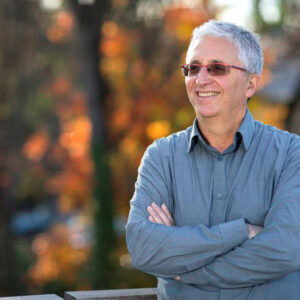Alon Confino, historian of modern Germany, nationalism, collective memory, the Holocaust, Israel/Palestine, and the year 1948, has died. Many have written beautifully about him already. This essay arises from a single hope: to pay public respects to a scholar of astonishing creativity, intellectual courage, and an unremitting curiosity about his fellow human beings and their mysterious affinities. As my PhD advisor, he gave me what Proust called “other eyes” to see with. He changed my life.

Photo courtesy Institute for Holocaust, Genocide, and Memory Studies, University of Massachusetts Amherst
Alon’s approach to history was methodologically inquisitive and philosophical. He entreated historians to ask themselves, “Why [do] I think the way I do about the past?” A cultural historian, he was less interested in correcting what people in the past got wrong than in understanding what could be learned from how wrong they got it. He was interested in the meaning of things, in all their glory and horror. Of utmost concern was human imagination. “To write a history . . . without an act of imagination,” he wrote in 2015 about the Nakba in the Palestinian village of Tantura, “is an intellectual and emotional dead end.” To “open our imagination” is to become like “a flower turning to the sun.”
Throughout his life, Alon was interested in how people develop feelings of national belonging. There is something inherently ambiguous and enigmatic about how people become national. Alon had a high tolerance for ambiguity and enigma, and did not think that you could do history well if you were strongly attached to particular theories about how it worked. Ultimately, what Alon wanted to capture was what he called “historical sensation,” a subtle quality that required the historian to remain attuned to the “total strangeness of the past.”
Alon liked the past for its mystique and intangibility. These words, along with strangeness, became in his usage equal parts method and lexicon. Yet his attachment to the word commingle—which anyone acquainted with his work will have noticed—was special and told volumes. Commingle connotes lightness and motion. It is not about fixedness or walls or sharp edges or absolute certainty. It is about multiplicity and relationships and freely drifting around.
For Alon liked plurality and the wild and barely explicable unfolding of change. He liked “the infinite diversity of things.” Though a voracious reader of historiography, he was not especially interested in the nitty-gritty of specific historiographical questions. His project often involved historicizing historiography, unearthing the unacknowledged or unobserved accretions that went into its production and shaped whole fields.
Foundational Pasts: The Holocaust as Historical Understanding (Cambridge Univ. Press, 2012) conveys Alon’s singular brand of historical thinking as well as anything he wrote. In it, he proposed to read the Holocaust, the foundational event of the 20th century, against the French Revolution, long seen as the inaugurating event of modernity. The revolution became a yardstick against which to assess the relative significance of the arguments, methods, and narratives of an ever-vaster body of Holocaust historiography. It was chilling but true when he wrote, “Whereas once the Revolution was a crucial measure of things human, now it has become the Holocaust.”
Truth comes in a lot of flavors, Alon knew: some toothsome, some bland, some completely unpalatable. He insisted that the historian should “cultivat[e] a certain familiarity with [the] tastes, attitudes, mentalities, values, and beliefs” of people in the past. Finding contemporary explanations of the Holocaust “too cerebral, too cautious,” he looked for new insights within Nazi fantasies of a “world without Jews.” It was an extraordinary demand that he made foremost of himself: that a Jewish scholar of Germany try to imagine things as Nazis did. While the “unbearable closeness” of the Third Reich might encourage the historian’s detachment, he wrote, “excessive detachment can deaden historical imagination and block access to . . . [historical] subjectivity.” With an unshakable commitment to honesty, Alon stuck to it.
Alon Confino loved history and being a historian. Even more, he loved life. Love for life and the living and the once living was the source, I think, of his whole creative endeavor. Because Alon was not just a historian. For him, history provided a creative outlet, dare I say an art form, for exploring life in just a few of the mind-boggling and sublime and terrifying forms it takes.
Monica Black
University of Tennessee, Knoxville
This work is licensed under a Creative Commons Attribution-NonCommercial-NoDerivatives 4.0 International License. Attribution must provide author name, article title, Perspectives on History, date of publication, and a link to this page. This license applies only to the article, not to text or images used here by permission.